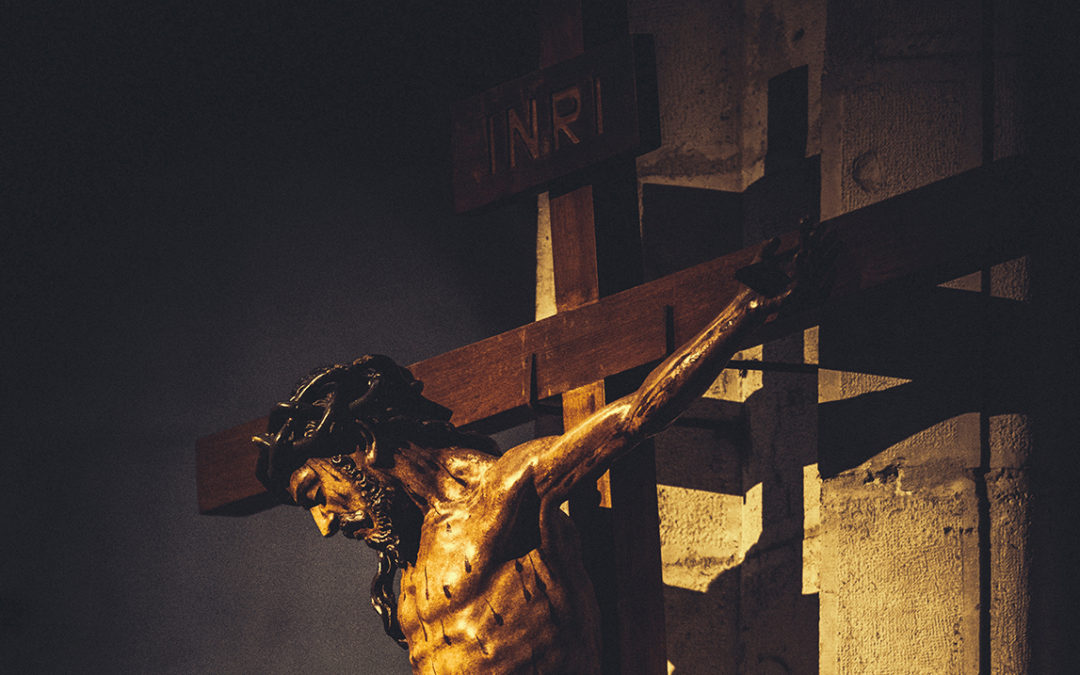If you were asked to name your favorite novel, song, movie, or TV show, you would probably respond with the title of each one. My own answers, for example, would be: Unbroken, “Gesù Bambino,” The Lord of the Rings trilogy, and ESPN Films’ 30 for 30. I doubt many of us would say, “That book written by Mark Twain” or “That movie with Meryl Streep.” Why not? Because the title is essential to the identity of what you are talking about. Ask any good author, poet, director, or artist; the power is in the title. The title draws us in, gives clarity to what we are witnessing, and gives meaning and significance to what we are experiencing.
Looking at the life of Jesus Christ, we see that he was a man of many titles: Prince of Peace, Light of the World, Good Shepherd, and Bread of Life, just to name a few. But there is one particular title that stands out during this Easter season. It was put on display at his crucifixion: King of the Jews.
We read in John 19 that Pontius Pilate ordered that a sign proclaiming this title be placed above Jesus’ head on his cross. It was normal practice to communicate a particular criminal’s crime for all to see, but there was something about this sign that was different. The Apostle John paints the scene this way (19:19-22):
Pilate had a notice prepared and fastened to the cross. It read: Jesus of Nazareth, the King of the Jews. Many of the Jews read this sign, for the place where Jesus was crucified was near the city, and the sign was written in Aramaic, Latin and Greek. The chief priests of the Jews protested to Pilate, “Do not write ‘The King of the Jews,’ but that this man claimed to be king of the Jews.” Pilate answered, “What I have written, I have written.”
What led Pilate to write these words, not of a crime, but asserting a title? Pilate had been convinced that Jesus was innocent of any crime and had tried numerous times to have him set free. In the end, Pilate succumbed to both his own weaknesses and the riotous crowd that had been seething outside his chambers. The Jewish authorities and the crowd had heavily influenced his leadership and decision-making as governor and judge regarding Jesus. This sign on the cross would have surely incited rage in the Jewish high priests. Consider it Pilate’s final attempt to show them up. Worse yet, for them, was that this sign was written in several languages so that everyone could read it as they passed by. All could see the title of the man on the cross; all could be met with the significance of those words: King of the Jews.
Pilate had a first-hand experience with Jesus as he interrogated him in an effort to find out why this crowd was so angry with him—angry enough to want him killed. Jesus was brought to Pilate as a political criminal, as one who claimed to be a king and opposed the rule of Rome. Such a charge was nothing new to Pilate, but Jesus was not that kind of king—as Jesus himself told Pilate, “My kingdom is not of this world… my kingdom is from another place” (John 18:36). Pilate knew that the Jews despised Roman rule and authority. He also knew that their coming Messiah would be a king. So, what was the issue? The Jewish authorities said that this man claimed to be King of the Jews. Why did they not want him as their king?
In this moment the truth was revealed to Pilate by the chief priests, the representatives of their faith and their people, as they responded: “We have no king but Caesar” (John 19:15b). Those were their words. The people did not want Jesus as their king and they definitely didn’t want a sign proclaiming that to the world. This response given to Pilate by the chief priests on two occasions went against their own integrity, their own beliefs, and ultimately their own God. This defiant, rebellious, treasonous statement eerily defames the words of the prayer that the Jewish people would have prayed during the Passover, which they were in the midst of celebrating: “From everlasting to everlasting Thou art God; beside Thee we have no king, redeemer, or savior; no liberator, deliverer, provider; none who takes pity in every time of distress or trouble. We have no king but Thee.”1
Many in the crowd that day were met with the unspoken question, “Who is your king?” Many passersby at the foot of the cross were met with the title, “Jesus of Nazareth, the King of the Jews.” We today are also met with this question and conviction. As you approach the cross this Easter season, who holds the title of king in your life? What other things, titles, or people are pitted against King Jesus as you operate day-to-day? Many kings compete for our attention: money, fame, self-image, job, reputation, possessions, etc. But we are met with the same King. This is the One who died in our place, who took on our sin and our punishment so that we could live and be free. Jesus longs to free us from the oppressive sin, shame, and guilt that threaten to enslave us. In addition, he offers us true life. What does it mean for Jesus to be your King? He is not just the King of the Jews, he is also the King of you and me.
Ben Bigaouette serves Oak Hill Church in Bloomington, Minnesota as Associate Pastor.

